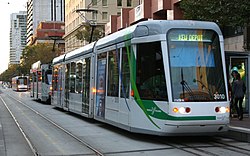| Company type | Government Agency |
|---|---|
| Predecessor | Public Transport Corporation |
| Founded | August 1999 |
| Founder | Government of Victoria |
| Defunct | 30 June 2013 |
| Successor | Public Transport Victoria |
| Headquarters | |
Area served | Victoria |
Key people | Brandon Mack (final Director of Public Transport) |
| Services | Promote, provide, coordinate and regulate public transport in Victoria |
| Website | http://www.transport.vic.gov.au |

The Director of Public Transport (also referred to as the Director, or the DPT) was the head of the Public Transport Division (PTD) of the Victorian Department of Transport. PTD was the government agency responsible for promoting, providing, coordinating and regulating public transport in the state of Victoria, Australia between August 1999 and June 2013. The Director of Public Transport was created as a statutory office supported by staff of the Department of Transport.
Contents
- Main responsibilities
- Trains, trams and buses
- Taxis and hire cars
- Other responsibilities
- Governance
- Establishment
- Transport Integration Act
- Other Victorian transport agencies
- Statutory office
- Statutory authorities
- Independent transport safety agencies
- Abolition of the Director of Public Transport
- See also
- References
- External links
The key responsibilities of the Director centred on the entering into and management of franchising contracts with train, tram and bus companies to provide public transport services in Melbourne and Victoria. The Director also had oversight of the Victorian Taxi Directorate which regulates the taxi and hire car industry in Victoria. As part of its operational functions, the DPT also had responsibilities relating to public transport planning and projects as well as the accreditation of passenger transport companies for enforcement purposes and the appointment and management of authorised officers for enforcement activities across Victoria's public transport system.
On 2 April 2012, the majority of the Director's functions were transferred to either the newly created Public Transport Victoria or the Secretary of the Department of Transport. The office of the Director of Public Transport was abolished on 30 June 2013.






